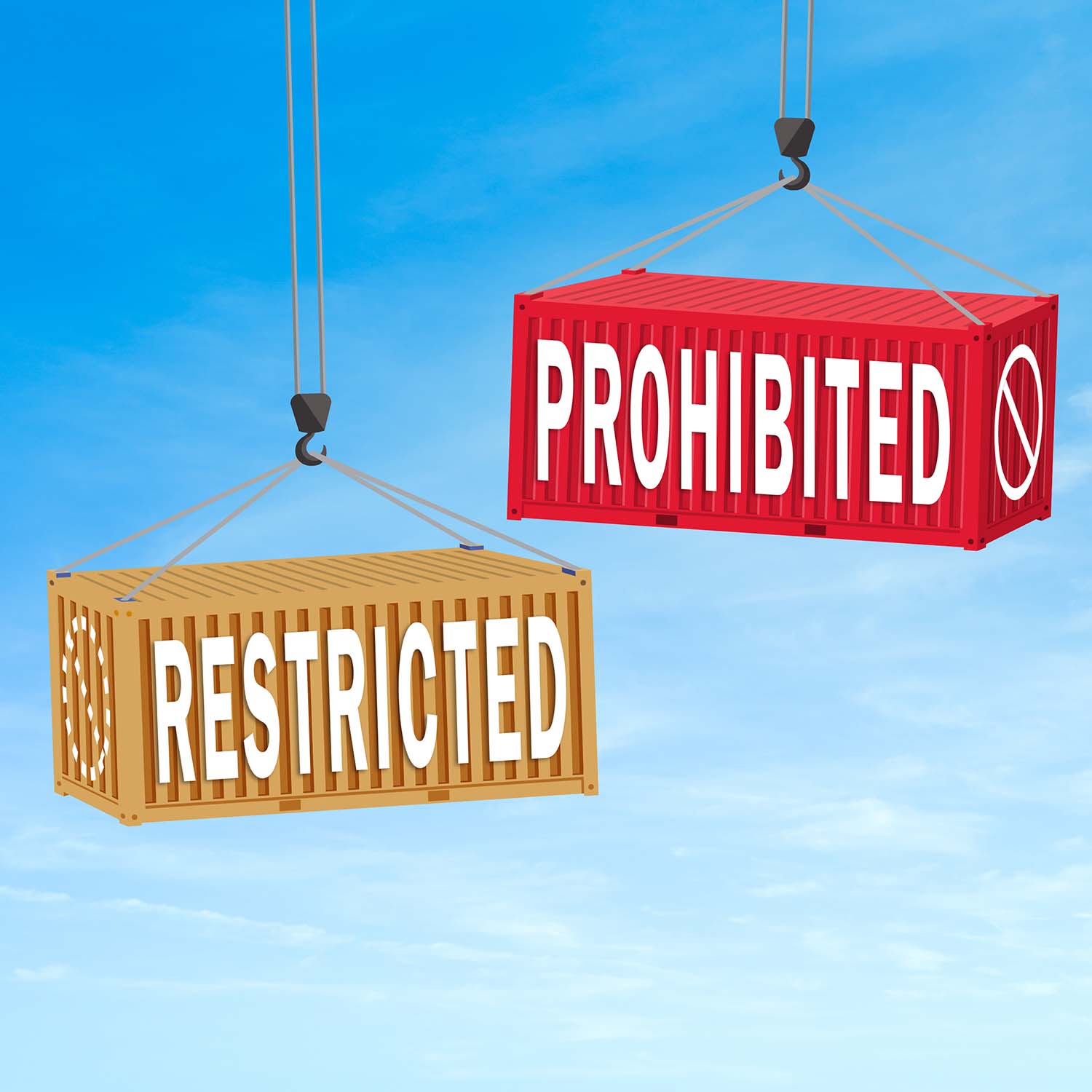Import: Restricted and Prohibited
Restrictions and Prohibitions
All countries restrict or prohibit the import and export of certain articles based upon:
- Concerns for health, safety, and public morality (e.g., foodstuffs, agricultural products, live animals, biologic materials, pharmaceuticals, illicit drugs, chemicals, hazardous products, and materials deemed indecent).
- Protection of the physical and economic security of the state (e.g., arms, armaments, dual-use technology, radio and television transmitters and receivers, radioactive materials, seditious materials, and currency).
- Economic protection or subsidization of domestic industry (e.g., non-tariff barriers to trade for imports and control of natural resources for exports).
- Enforcement of provisions of multi-lateral trade agreements (e.g., those designed to protect endangered and threatened species of animals and plants and those designed to protect copyright, patent, and trademark holders against infringement).
Restricted
Products controlled under import licenses are as follows:
- Antique idols, including parts thereof, and parts of ancient monuments from or originating from other countries
- Ceramic food containers coated with lead of solubility more than two milligrams per liter
- Potato, rice, coffee, gunny bag, tobacco, dried longans, and jute
- Coins in size and weight similar to coins in official circulation
- Fish meal with protein lower than 60%
- Fresh milk, not concentrated, whether sweetened or not
- Guns, bullets, and explosives
- Gold ores, gold bars in lumps, in foil, or in any other form, or mixed with any materials, excluding goldsmiths’ wares generally used as personal ornaments
- Machinery and parts thereof that may be used to violate copyrights of cassette tapes, videotapes, and compact discs
- Marble, travertine, ecaussine and other calcareous monumental and building stones of an apparent density of 2.5 kilograms or more, per thousand cubic centimeters
- Six-wheel buses, 30-plus passenger capacity, whether fitted with seats or not
- Used engines, parts, and accessories of motorcycle displacement not over 50 cc and wheels with diameters not over 10 inches
- Used motor vehicles, whether reconditioned or not
- Vinyl chloride monomer
- In form of gas or liquid under pressure
- Mixed or combined with product contained in aerosols
- In air sprays, insecticides, hair spray, and air fresheners
- Waste, parings, and scrap of plastic
- Worked monumental or building stone, alabaster, and articles including mosaic tiles
Prohibited
- Obscene objects/literature/pictures
- Pornographic materials
- Narcotics (for instance, marijuana, hemp, opium, cocaine, morphine, or heroin)
- Fake currency, bonds, or coins
- Fake royal/official seals
- Goods infringing intellectual property rights (IPR), for instance, musical tapes, compact discs (CDs), computer software, and so on
- Counterfeit trademark goods
Special Licenses and Registrations
Alcohol
Importers are required to obtain a license issued by the Excise Department, Ministry of Finance if they plan to:
- Import more than a liter of alcohol
- Transport untaxed alcohol from a factory
- Transport more than 10 liters of alcohol
- Transport more than one liter but less than 10 liters of alcohol between specified territories (provinces)
- Sell alcoholic beverages
Petroleum Products
To import the following, the importer must be registered with the Department of Energy as a trader under Section 7 of the Fuel Trade Act, B.E. 2543:
- Naphtha
- Gasoline
- Diesel fuel
- Paraffin
Uncut Diamonds
To import uncut diamonds, importers must register with the Department of Foreign Trade of the Ministry of Commerce.
Note: The above information is subject to change. Importers are advised to obtain the most current information from a customs broker, freight forwarder, or the local customs authorities.
Article written for World Trade Press by Taylor Holloran, Jennifer Goheen, and Nina Bellucci.
Copyright © 1993—2025 World Trade Press. All rights reserved.

 Thailand
Thailand 